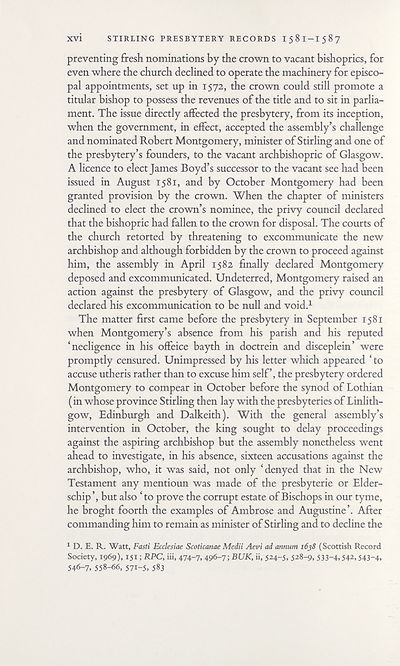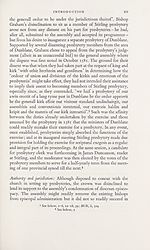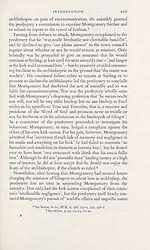Series 4 > Stirling Presbytery Records 1581-1587
(21) Page xvi
Download files
Complete book:
Individual page:
Thumbnail gallery: Grid view | List view

xvi STIRLING PRESBYTERY RECORDS I581-I587
preventing fresh nominations by the crown to vacant bishoprics, for
even where the church declined to operate the machinery for episco¬
pal appointments, set up in 1572, the crown could still promote a
titular bishop to possess the revenues of the title and to sit in parlia¬
ment. The issue directly affected the presbytery, from its inception,
when the government, in effect, accepted the assembly’s challenge
and nominated Robert Montgomery, minister of Stirling and one of
the presbytery’s founders, to the vacant archbishopric of Glasgow.
A licence to elect James Boyd’s successor to the vacant see had been
issued in August 1581, and by October Montgomery had been
granted provision by the crown. When the chapter of ministers
declined to elect the crown’s nominee, the privy council declared
that the bishopric had fallen to the crown for disposal. The courts of
the church retorted by threatening to excommunicate the new
archbishop and although forbidden by the crown to proceed against
him, the assembly in April 1582 finally declared Montgomery
deposed and excommunicated. Undeterred, Montgomery raised an
action against the presbytery of Glasgow, and the privy council
declared his excommunication to be null and void.1
The matter first came before the presbytery in September 1581
when Montgomery’s absence from his parish and his reputed
‘necligence in his offeice bayth in doctrein and disceplein’ were
promptly censured. Unimpressed by his letter which appeared ‘ to
accuse utheris rather than to excuse him self’, the presbytery ordered
Montgomery to compear in October before the synod of Lothian
(in whose province Stirling then lay with the presbyteries of Linlith¬
gow, Edinburgh and Dalkeith). With the general assembly’s
intervention in October, the king sought to delay proceedings
against the aspiring archbishop but the assembly nonetheless went
ahead to investigate, in his absence, sixteen accusations against the
archbishop, who, it was said, not only ‘denyed that in the New
Testament any mentioun was made of the presbyterie or Elder-
schip’, but also ‘to prove the corrupt estate of Bischops in our tyme,
he broght foorth the examples of Ambrose and Augustine’. After
commanding him to remain as minister of Stirling and to decline the
1 D. E. R. Watt, Fasti Ecclesiae Scoticanae Medii Aevi ad annum 1638 (Scottish Record
Society, 1969), 151; RPC, iii, 474-7,496-7; BUK,ii, 524-5, 528-9, 533-4.542.543-4.
54<5-7. 558-66, 571-5, 583
preventing fresh nominations by the crown to vacant bishoprics, for
even where the church declined to operate the machinery for episco¬
pal appointments, set up in 1572, the crown could still promote a
titular bishop to possess the revenues of the title and to sit in parlia¬
ment. The issue directly affected the presbytery, from its inception,
when the government, in effect, accepted the assembly’s challenge
and nominated Robert Montgomery, minister of Stirling and one of
the presbytery’s founders, to the vacant archbishopric of Glasgow.
A licence to elect James Boyd’s successor to the vacant see had been
issued in August 1581, and by October Montgomery had been
granted provision by the crown. When the chapter of ministers
declined to elect the crown’s nominee, the privy council declared
that the bishopric had fallen to the crown for disposal. The courts of
the church retorted by threatening to excommunicate the new
archbishop and although forbidden by the crown to proceed against
him, the assembly in April 1582 finally declared Montgomery
deposed and excommunicated. Undeterred, Montgomery raised an
action against the presbytery of Glasgow, and the privy council
declared his excommunication to be null and void.1
The matter first came before the presbytery in September 1581
when Montgomery’s absence from his parish and his reputed
‘necligence in his offeice bayth in doctrein and disceplein’ were
promptly censured. Unimpressed by his letter which appeared ‘ to
accuse utheris rather than to excuse him self’, the presbytery ordered
Montgomery to compear in October before the synod of Lothian
(in whose province Stirling then lay with the presbyteries of Linlith¬
gow, Edinburgh and Dalkeith). With the general assembly’s
intervention in October, the king sought to delay proceedings
against the aspiring archbishop but the assembly nonetheless went
ahead to investigate, in his absence, sixteen accusations against the
archbishop, who, it was said, not only ‘denyed that in the New
Testament any mentioun was made of the presbyterie or Elder-
schip’, but also ‘to prove the corrupt estate of Bischops in our tyme,
he broght foorth the examples of Ambrose and Augustine’. After
commanding him to remain as minister of Stirling and to decline the
1 D. E. R. Watt, Fasti Ecclesiae Scoticanae Medii Aevi ad annum 1638 (Scottish Record
Society, 1969), 151; RPC, iii, 474-7,496-7; BUK,ii, 524-5, 528-9, 533-4.542.543-4.
54<5-7. 558-66, 571-5, 583
Set display mode to:
![]() Universal Viewer |
Universal Viewer | ![]() Mirador |
Large image | Transcription
Mirador |
Large image | Transcription
Images and transcriptions on this page, including medium image downloads, may be used under the Creative Commons Attribution 4.0 International Licence unless otherwise stated. ![]()
| Scottish History Society volumes > Series 4 > Stirling Presbytery Records 1581-1587 > (21) Page xvi |
|---|
| Permanent URL | https://digital.nls.uk/126646407 |
|---|
| Description | Over 180 volumes, published by the Scottish History Society, containing original sources on Scotland's history and people. With a wide range of subjects, the books collectively cover all periods from the 12th to 20th centuries, and reflect changing trends in Scottish history. Sources are accompanied by scholarly interpretation, references and bibliographies. Volumes are usually published annually, and more digitised volumes will be added as they become available. |
|---|


